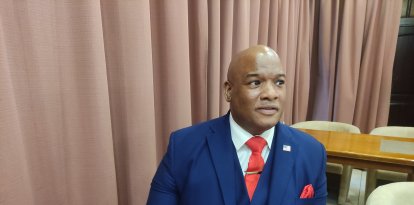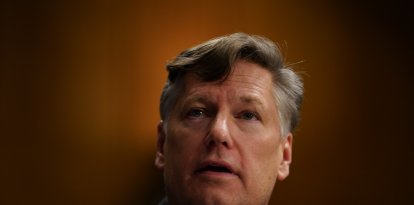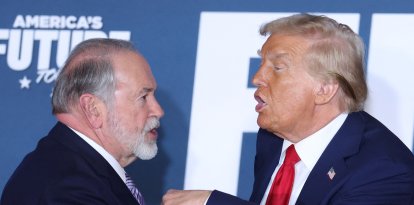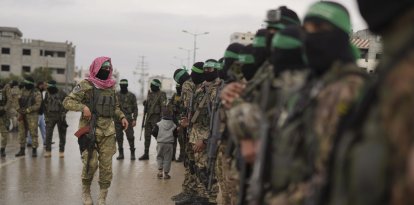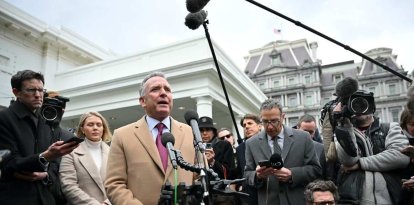NATO defends itself against... Donald Trump
Before the indifference of its enemies, the Atlantic Alliance celebrated its 75th anniversary by adopting new commitments of dubious fulfillment and frightened by a crucial doubt: who will be the next tenant of the White House?
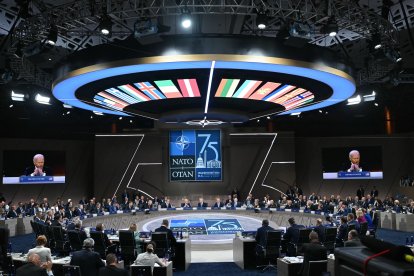
NATO heads of state meet at the Washington, D.C. summit
The Atlantic Alliance (but not its military structure, which starts a few years later) has just celebrated its 75th birthday in the place where it was born: Washington DC. But unlike in 1949, with the United States as a true hegemonic power of global reach and interest and with a president, like Truman, vigorous and battle-hardened, today America sows many doubts among its allies about its intentions and capabilities and is permanently harassed by a new aggressiveness of its enemies.
All in all - and as could not be expected otherwise - Alliance leaders have celebrated its longevity and have once again boasted of its historic successes and repeated their much-loved refrain that in the face of troubled times, what defense needs is more money, more men and more time.
Few doubt that Trump would force an agreement between Kiev and Moscow, even if that meant the partition of Ukrainian territory.
Whoever has the courage to read the 44 paragraphs of the official communiqué of this Washington Summit will realize that NATO scribes are very good at conceptualizing, but very bad at proposing concrete measures to make what they say a reality. Of course, the fault lies not with them, but with their bosses, those 32 heads of state and government who represent the member states and who never want to get their fingers caught with very concrete commitments.
Let us not forget that this was the eleventh summit at the highest level of the Alliance since Russia annexed Crimea and occupied Donbas and the third since its attempted full invasion of Ukraine. And the themes and promises come to be more or less the same.
Biden and Trump, the summit's focal points
In fact, the great novelties of this 75th anniversary Summit have come from elements exogenous to NATO itself: the first, the debate on Joe Biden's state of mind, especially in view of the November elections. In the corridors it was not known what could be more frightening, whether a new candidate chosen in a confusing convention in August, with all the electoral risks for the Democratic party; or whether the continuity of an octogenarian Joe Biden and with evident mental deficiencies, again exposed in a forceful way when in the press conference called Zelenski President Putin or Kamala Harris Trump's vice president. A NATO under a leader in permanent contention among his own cannot be the leader that the strategic times ahead need.
The second factor was the elephant in the room: Donald Trump whose mere possibility of a triumphant return to the White House horrifies European allies and leaves the entire Atlantic Alliance livid. First, because he is unpredictable; second, because he is presumed to have a greater animosity to the Alliance than in his first term; and, third, because it is feared that his personal vendetta over Zelenski will leave the Europeans alone in the face of Putin's danger.
And they have reason to be fearful. Despite the fact that the first commitment for each member to spend 2% of GDP on its defense dates back to 1978, and despite the fact that every summit applauds the growing military effort of its members and urges that at the next one the goal be reached, still, as of today, a third of the countries are far from being able to take it for granted. Among others, Trudeau's Canada and Sanchez's Spain.
Regarding Ukraine, few doubt that Trump would force an agreement between Kiev and Moscow even if that meant the partition of Ukrainian territory. Hence the interest in tying up the next aid package for 2025, which theoretically will reach 40 billion (although little is known who will actually put it in). But, as I say, the important thing to approve was not the amount, but the timetable. Despite the fact that a Trump president could renege on that commitment perfectly well, which would render it meaningless.
It is true that NATO has also committed to send a permanent representative to Kiev, an unprecedented event in its long history. And it has stated that Ukraine's accession to the organization is irreversible. But he has taken care not to say how or when. One can think in years or decades. Hence the impression on the Ukrainian delegation attending this summit was not as positive as they expected.
The real problem for NATO lies in the huge gap between its analysis of a world of strategic imbalances, military risks and threatening enemies and its historical temptation to make progressive and incremental changes. And as we know, you cannot lead a revolution with managerial techniques.
The indifference of enemies
Perhaps most serious is not the Alliance's laudatory tone toward itself, but the contempt this summit has generated in its avowed enemies and adversaries. China has complained briefly about being called a facilitator of the invasion of Ukraine; Putin has not lifted a finger. And other truly dangerous countries, such as Iran, continue their aggressive actions throughout the Middle East without worrying about what allies say. There are their Houthis disrupting all maritime trade with hardly anything being done. Barking dog, little biter, they seem to believe.
And there are serious countries, concerned countries, countries rogue or rebels and cynical countries. The only winners are precisely these: the members like Canada and Spain whose leaders occupy the media space to re-promise what they know they will not fulfill, aware that everything comes for free in this Western world where the star is dead. Even if NATO does not know it yet.
RECOMMENDATION

